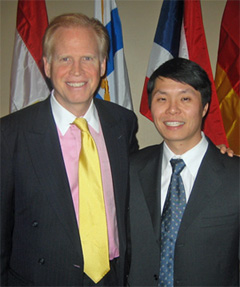|
They join a
distinguished group returning from last year
that includes Sedo
co-founder and CEO Tim Schumacher, WashingtonVC
founder and BuyDomains co-founder Michael
Mann, T.R.A.F.F.I.C.
co-founders Rick Schwartz and Howard
Neu, Moniker CEO Monte
Cahn, Internet Real Estate Group
co-founder Andrew
Miller, two giants from the
geodomain field, brothers Michael
and David Castello (founders of the Castello
Cities Internet Network - CCIN), ParkLogic.com
co-founder and WhizzbangsBlog author Michael
Gilmour and Internet
Commerce Assocation Legal Counsel Phil
Corwin.
You can read this
detailed report straight through, or jump to the
links at the bottom
of each page to go directly to the page that
features the person whose comments you want to
read first. Each expert's name is featured in a
bold heading at the start of their commentary,
making it easy to find and revisit your
favorites. We will be covering a lot of ground
but with the challenges the industry (and the
world at large) is currently facing, we think
you will find the information rewarding and the
time you invest well spent - so let's get
started...
Monte
Cahn (Moniker. com)
|
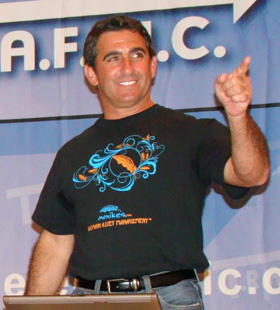
Moniker
CEO Monte Cahn |
Last year I
kicked off our report with comments from Monte
Cahn, partly because he had just completed a
huge deal to sell his company, Moniker, to Oversee.net
(where he stayed on to continue running the
Moniker division). Again this year Oversee made
big news just as we started putting this article
together - this time by announcing an 18%
workforce reduction across all of their
divisions (including DomainSponsor, SnapNames
and Moniker). That cutback came on the heels of a
10% reduction last summer.
Because of the timeliness of that
news, as well as Cahn's vast experience
in all phases of the domain industry
(aftermarket, registrar and PPC) I am
going to use him as our lead off batter
again this year, starting with a comment
on Oversee's second round of layoffs - a
move dictated by both market conditions
and the natural process of eliminating
overlapping responsibilities
across various divisions following the
acquisitions of Moniker and SnapNames. |
"The end of 2008
became a time of great focus for our
division (Registrar and Aftermarket) and Oversee
as a whole," Cahn said. "We started
the process of controlling unnecessary expenses,
cross training, and integrating our business
units in advance of our 2009 budget and plan."
"As I predicted
in last
year's January cover story, 2008
was a year of consolidation. Partners
joined forces and competitors merged. And
in doing so many in the industry overcame
challenges, realized opportunities and some also
gained efficiencies. As a whole, the
overall domain market experienced major
adjustments due to significant changes in
the way Google dealt with click fraud and
traffic quality. In addition to PPC
revenue decreasing from these adjustments,
the overall economy had material affects
on the amount of investment capital available
for domain purchases."
| "Although Moniker
and SnapNames fared well through this
uncertainty by producing solid sales results
in our live and online auctions,
towards the end of the year, we did notice a decrease
in domain portfolio retention on the
registrar side," Cahn said. "For the
first |
| time, many began to "cherry
pick" through their inventories and allow
domains to expire that they normally would
have renewed. Others transferred domains to
cheaper registrars, putting price in front of good
value, service and security. At the same
time, we saw several good domain purchases
– some would say bargains – in both public
and private transactions. Some of the best
names from top investors went up for sale.
Many of these domains have never been available
for sale previously. "It’s also important
to note that many relied on the strong value of
their domain assets to cover other personal expenses
outside of the domain industry."
"Domain
development became a popular topic at
conferences as well as other alternative
monetization strategies such as micro sites
development and networking, affiliate sites,
lead generation and CPA modeling for domains."
Though the domain
industry is still much better off than other
sectors of the economy, the |
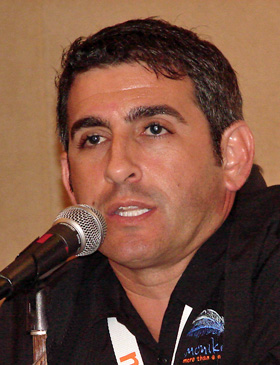
|
| severity of the
current downturn is such that no sector can
expect to be unaffected this year. On that point
Cahn noted, "The economy will certainly
have affects on our industry in 2009.
However, down markets become great
opportunities for the future as internet user
growth continues to expand at enormous
rates worldwide. Broadband and high-speed access
are available in almost every country at little or
no cost, including third world countries.
The cost of computers continues to decrease
and the mobile market is expanding with new
wireless networks, improved portable phones,
PDA's and handheld entertainment systems." |
"The cost to
register a domain and build a website remains
more than reasonable compared to other types of
start up businesses. In addition, increased
unemployment resulting from a weak economy,
becomes the breeding ground for
entrepreneurialism, new ideas, and new
start-up online businesses. These
factors along with advancements in SEO and
SEM tools and strategies, will produce more
online activity, more traffic, more domains
registered and should result in better conversion
rates. This will set a new foundation
for our industry to learn from, build upon, and
improve our offering to new and existing markets,"
Cahn said.
Regarding Oversee in
particular, Cahn added, "we will continue
to focus on our core strengths in securing,
protecting, enhancing and increasing the value
of our client’s domains through our
Domain Asset Management™ suite of products and
services. We will focus on providing unsurpassed
security and customer service while
continuing to be the leading market makers in
domain name sales through live & online
auctions, private sales and escrow and appraisal services."
Ari
Goldberger (ESQwire. com)
|
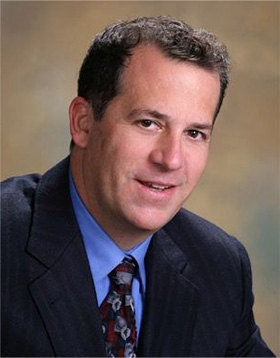
Ari
Goldberger, ESQWire.com |
Cahn mentioned the
increasing interest in domain development as a
way to offset declines in PPC revenue and
slowing sales for high end domains. That was a
recurring theme among many on our panel of
experts including prominent domain attorney Ari
Goldberger who told us "A significant
trend I see is that domainers seem to universally
recognize that in order to reap the
super-value of domains they must
“develop” them. With domain parking
revenues down across the board, the move toward
development has become relatively less risky
and costly (i.e. less parking revenue to
lose). On the other hand, the type of
development and a domainer’s capability to
develop a domain is an entirely different
story."
"I am working on
a plan to develop some high-profile domain names
with partners," Goldberger said. "The
process is very challenging. There are
important questions to ask before leaping into
development: What is the best application for a
particular domain name? Is the domainer experienced in
the product/service/industry associated with the |
| domain?
If the expertise is lacking, how
will the domainer gain it? Will a
domain support a successful business
just because it’s a great name?
There are great opportunities for a
domain-less individual with
industry-specific experience, technical
know-how and connections to link-up with
domainers lacking these qualities.
Social networking tools like Linked-in
and Facebook
can help these groups connect." |
"Ultimately, to
achieve real value it is essential to
build the best possible business as if you did
not have the benefit of a great domain. While
emulating what works out there is necessary and
smart, significantly more value can derive from
innovation and striving to be the ‘next
big thing,’ particularly when the business
is riding on the horsepower of a great domain.
Simply cruising with a revved-up parking page
and some pics and content will not
generate the double-digit multiples that these
great domains deserve," Goldberger noted.
| Like Cahn, Goldberger is
convinced that the current economic downturn can not derail the growing importance of
the Internet in everyone's lives. "While
business is definitely down, now more than ever
users continue to pile-on to the Internet for
all their needs to get the best deal. Internet
use will continue to increase as
traditional media outlets are unable to |
| compete
with the unique economies of the online model
(i.e. no paper, printing, delivery boys) and the
accelerating reach of the Internet as it becomes
THE PLACE where we all live, work, shop,
and communicate. I believe the biggest and most
exciting trend to watch for is the recognition
of traditional media businesses (print, TV and
radio) of these powerful opportunities of being online
– and not seeing the web as just something
ancillary to their “brick-and-mortar” biz,"
Goldberger said.
"While the newspapers
are singing the blues they still have tremendous
value that can be channeled online: name
recognition and brand power; knowledge of the
market; existing advertiser relationships;
experience in producing content which all sites
require (type reads the same online). So I
think you will see some media newspapers
realizing this, regrouping and, instead of
closing the doors on their business – opening
new doors online and growing it in ways
never before possible on large sheets of paper."
"Online is better
because the paper can now INTERACT with
its readers – making them |
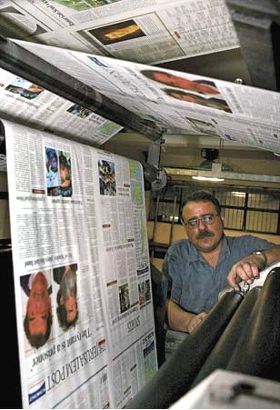
|
| “users” and
“customers.” Newspapers can now not
simply put up a classified ad for a car, it can
run online auctions. Newspapers can sell
products to its users. Newspapers need to
recognize that the goodwill they have in the
community is tremendously valuable. Their
editorials have meaning and their political
endorsements make news. It just doesn’t make
sense for their product to be distributed on
pieces of throwaway paper any more.
The sooner they realize it the better
chance they have of salvaging what is left of
their brand." |
Goldberger concluded, "Why
does this matter to domainers? I
believe these media entities, in shifting to the
Internet, can do well and grow their audiences
by adopting powerful generic domain name
brands, so I think they will be good
customers for us as they recognize the power of
the Internet. In addition, this continuing
trending away from traditional media to
online is a great thing for domainers.
So while times are looking tough in the
overall economy, I think the good news for
domainers is that the Internet will continue to
grow and grow with every new user and with more
and more business being conducted online. I
also am looking forward to a new generation
of marketing folks and advertisers who recognize
the incredible value of domains and see
the Internet as the central location of every
business and of course the domain is the entry
point to that location. A great domain
is not only a door but a powerful magnet. So,
I am bullish on the future of domains and
their value."
Andrew
Miller (Internet Real Estate Group)
|

Andrew
Miller
Internet Real Estate Group |
Andrew Miller is
President and co-founder of the
Boston-based Internet
Real Estate Group (IREG), a
company that has bought, sold and developed some
of the world's best generic domain names,
including CreditCards.com, Software.com
and Shop.com. Miller told us, " 2008
was a year that brought those that rely on
domain names as core to their business further
realization that domains are digital real
estate and like traditional real estate, the
more true value that is developed around
that domain name, the more valuable the
asset.
There is still money to be made wherever one
sits within the domain monetization
spectrum, but the more that the domain is
leveraged into a game changing business, the
more value is created."
"Of course, 2008 presented new challenges
which carry into 2009, but I finished the year very
excited about how domains as an asset class
held their own amongst many other free falling
assets, and while there are peaks and
valleys in any element of business and
life, the domain
valleys are not as deep as others, rebound
faster and stronger, and present |
| significant
opportunities. Several of our early
stage developments at IREG and
seperate from IREG are poised for a
tremendous 2009: These Include Chocolate.com, Patents.com,
Phone.com, InsuranceQuotes.com,
SimpleDomains.com and Alerts.com,"
Miller said. |
"Most important, is
the continuing need to find ways to educate
those around us on the importance of dotcom
domain names to their respective businesses.
This includes Fortune 500 Senior
Management, VC's, Private Equity, budding Entrepreneurs,
Business Schools, Professors, and even Internet Entrepreneurs
or Management. The place we need to start is to
use 2009 for the domain industry to further
mature and understand the value of their own
assets, and where that value lies. The 80/20
rule applies here."
| "Domainers need to
shift the perception, and their own mindset,
from first asking "what is the traffic or
what is the PPC revenue". That is important
to know but its the 20 percent portion of
the value. The 80 percent portion of the
value is: the indelible branding advantage
provided by generic domain names; the search
engine optimization and search engine marketing
advantages that generic domains induce; that if
you have a large, established brand
already, that owning your category generic
domain name likely will give you two kicks at
the can on page 1 of Google, both SEO
and SEM wise; the recall when
marketed or advertised; the perceived
credibility of the website, both in business
development and to end customers; the fact that
website visitors return to generic domain
websites at a much higher percentage.
These are only a handful of examples,"
Miller said. |
|
"Domainers need to move on from the shorter
end of the stick and teach the 80 percent of the
value. Domainers need to stop appraising and
pricing domains based on the 20 percent side of
the equation and the small revenue associated
with the 20 percent side and educate the market
that the true value lies within the
Intellectual Property and direct
advantages the domain provides from
inception to exit. We must stop cutting off our
nose to spite our face, and remaining at the lowest
end of this. Move from speculators to business
builders, ensuring domains end up in the
hands of the entity that can leverage the brand
value more than the lowest denominator." |

|
Miller continued..."And,
we need to stop diluting the market with
TLD's that continue to be money making vehicles
for the industry. I ask you all, to spend one
week listening to the radio and looking at
outdoor advertising while you drive, watching
prime time TV, and observing all media over that
week timeframe and at the end, add up the
percentage of the hundreds of millions of
advertising spent that week was .com, and
what percent was any other TLD, years into .tv,
.biz, .us etc. The results will be
telling and likely 98 + percent .com and
the rest .org."
"We need to grow this
industry up in 2009," Miller
concluded. "The Internet and domains are still
strong, within a difficult, unprecedented
economy. People are still buying domains, buying
Chocolate gifts, looking to save money on their
insurance, searching for Patents, using and
switching to VOIP , playing fantasy
sports, and engaging in more and more day to day
online behavior. The key now is to put the
domains in the hands of those who can extract
the most value, and, in educating.
Owning a top generic dotcom domain for your
business is like starting the 26 mile marathon
at mile 3 while everyone else is starting
at mile 1. A huge head
start."
The
Castello
Brothers (CCIN. com)
|
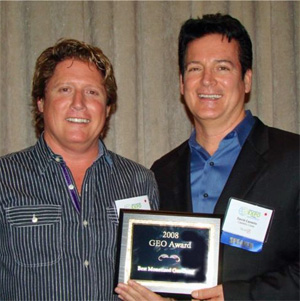
Michael
Castello (left) and David Castello
Castello
Cities Internet Network |
With respect to
development, geodomain owners are the
role models many look up to. Owners of large
.com city domains have probably developed (and
more importantly developed well) a
greater percentage of their domain assets than
owners in any other sector. Because of that we
pay close attention to leaders in the geo space
like the Castello
Brothers, Dan
Pulcrano, Skip
Hoagland and many others.
The Castellos, Michael and
David, own gems like PalmSprings.com, Nashville.com
and Acapulco.com to name just a few.
Michael predicted, "We will see a continued
move towards site development as domain name
owners place their stake in the future world of self
sufficiency and empowerment. CCIN
has seen stability and is developing toward the
future just as we had accomplished in the dotcom
bubble of 1999 and 9/11. We are currently
witnessing a dynamic power shift of
|
|
unprecedented proportions that will continue to
propagate globally. The Internet and those with
developed land of impassioned impulse will reap
huge benefits. I project a larger trend in
the area of self branding and this will make
memory based names more valuable as more site
saturation evolves in the dotcom industry. My
suggestion to Internet individuals for the year
is Brand Yourself." |
David Castello noted,
"Domain names are the real estate of the
Internet and, like traditional real estate, it's
going to come down to two things: development
and location, location, location. In
this dark economy, the Internet is going to shine
in 2009, but it will prove to be a
double-edged sword for many domainers. If
you're parking great domain names in
2009 you need to prepare for the barbarians
at the gate. The scales have fallen
from their eyes, they're beginning to believe
that domain names are the new bullion and
the best strategy to deter them is a well
developed site."
| "On the other hand,
don't worry about ICANN and their
misguided plans to flood the world with TLDs
(while enriching their coffers). It
will only push the value of dotcom and ccTLDs higher
because most people can't intuitively remember a
domain name using anything else |
| (Factcheck.org
anyone?). Speaking of, remember the
pundits in 2000 who said Internet commerce would
never surpass brick & mortar? They're now
the same people predicting that dotcom
will become irrelevant because everyone looks
for everything on search engines. In
other words, the importance of stamping
your brand into the public's
consciousness will go the way of the dodo bird
and the dinosaur because of Google and Yahoo.
Remember that when you watch the Super Bowl
ads!" Castello smiled.
Looking back at the events
of the past year David said, "The most
significant event of 2008 was the stock
market crash and the super-recession
aftermath. Ironically, nothing could
be better for the future value of Internet
addresses, particularly premium generic and
geodomain dotcom and ccTLDs. As
traditional media and thousands of brick &
mortar businesses gives way to the Internet, the
ability of the new Internet based economy to
help pull us out of this recession in 2009 will
become apparent and domain names will ride
the crest of the wave." |
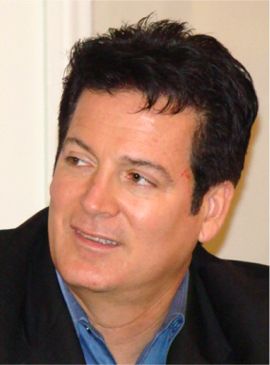
|
Michael Castello opined
"The most significant trend was the
continued Connecting of the DOTS of Perception
for geodomains in the world wide web. It is
starting to look more like a virtual world. The
most significant event in 2008 was the
intercession of the Commerce Department
into ICANN’s plans for hundreds of new TLDs.
Those plans appeared to be set in stone,
but it shows that oversight by a knowledgeable
Commerce Department made clear that the process
would potentially cloud the waters for
the public. It is ICANN’s public duty to
clarify and define the road ahead. In my
opinion the extra burden of the new TLDs would
have reduced the inherent potential of domain
names and direct navigation which has already
been defined to the public and has clear
clarity. The power shift needs to move back to
the public."
|












